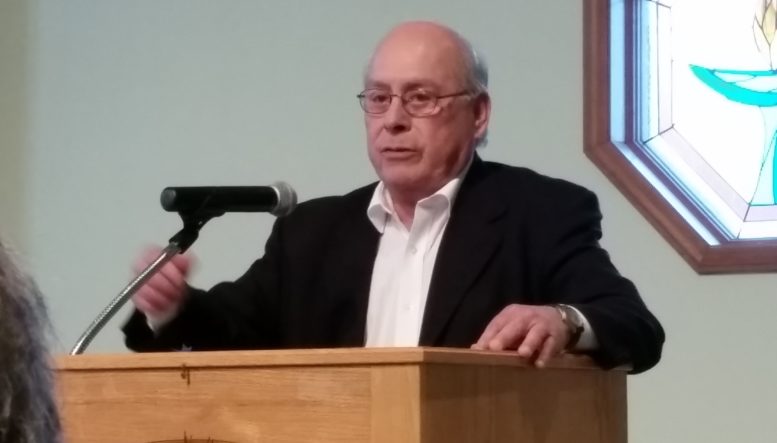By JAN LARSON McLAUGHLIN
BG Independent News
The Toledo area has anywhere from 6,000 to 10,000 undocumented immigrants. But every week, more are rounded up and shipped out from the Toledo airport, according to farm labor leader Baldemar Velasquez.
“Every Tuesday morning, there are more men and women in shackles being boarded onto planes,” Velasquez said Sunday afternoon. Many are being sent back to Mexico through expedited deportations, without being allowed to see an attorney and without being given their due process, he said.
“I don’t know how they are getting away with that,” Velasquez said about ICE and border patrol.
“One-hundred years from now, people will look back at us like they do the Fugitive Slave Act of 1850,” when the law required escaped slaves to be returned to their owners, he said. “The fact that we are accommodating such a practice is un-American.”
Velasquez grew up as a migrant farm laborer, born in Texas and traveling from field to field in the Midwest.
Based on those experiences he went on to create the Farm Labor Organizing Committee, in response to the poor treatment of farm workers. That organization, celebrating its 50th anniversary, still works to achieve justice for migrant workers.
Velasquez, who spoke Sunday at the Unitarian Universalist Church north of Bowling Green, grew up dirt poor, with a work ethic stronger than most of his white classmates, and with stamina that just didn’t quit.
“You always have to finish the job,” he said. “You start that row, you’ve got to finish it. You start that field, you’ve got to finish it. When you’re a farm worker, it doesn’t matter” if you are tired.
As an adult, Velasquez has fought for decent pay for farm laborers through FLOC.
“Give us a fair day’s pay for a fair day’s work. That’s all we want.”
Using boycotts and other strategies, FLOC fought in the past for the laborers in the fields and scored victories over giants like Campbell Soup, Vlasic and Mount Olive pickles.
Velasquez is still fighting for farm workers – now working to allow them to stay in the U.S.
He has heard it all from the other side. “What don’t you understand about illegal?” he has been asked. If Americans don’t want Mexicans here, then maybe they should reconsider policies such as NAFTA, which displaced many Mexican workers and caused an explosion of immigration to the U.S., he explained.
Thousands of Mexican farmers could no longer compete with the American farmers who have far better equipment and the benefit of government subsidies, Velasquez said.
“There is no wall, no impediment that can get in a man or woman’s way to feed their families,” he said. “If you don’t want them to come here, let’s talk about not displacing them.”
Velasquez has also heard the arguments about Mexican workers taking jobs from American citizens. “If you’re good enough,” he said, “you’ll get the job. Why are you afraid of competition from a bunch of uneducated Mexicans?”
And to be frank, jobs picking pickles and tomatoes don’t really seem to attract many white applicants. While many Americans are driving by in their air-conditioned cars on 90 degree days, “these folks are over there, stooping over” and picking from sunrise to sunset in the blistering sun.
It’s estimated that 12 million undocumented immigrants currently live in the U.S., many of them filling vital occupations and paying taxes, he said. “We don’t have enough native born workers to replace them” in these jobs.
Velasquez has also heard complaints that Mexicans should follow the legal process to become U.S. citizens. It’s not that easy, he said.
“It’s almost impossible to get legal entry,” he said, noting that Mexican citizens using the outdated and inefficient process can wait up to 15 years to get the proper permits – even if they already have family in the U.S. “There’s no rhyme or reason to our immigration system.”
Velasquez also pointed out the inequities in immigration policies.
“Most white Americans came here without any papers from Europe,” he said. “You have the freedom to travel, why can’t they have the freedom to travel?”
And despite accusations, statistics show immigrants have a very low incidence of criminal involvement. “The folks we know are more law-abiding than anyone,” he said.
The immigration laws make undocumented immigrants very vulnerable to extortion when they try to get legal status. Many undocumented immigrants tolerate poor working conditions and substandard pay because they are hesitant to speak up.
“They are afraid to complain because of fear of retaliation.”
And Velasquez has heard conservative people use the caustic term “alien” to refer to undocumented workers. To that, he rattled off several Bible verses that preach kindness and acceptance of “aliens.”
Velasquez spoke of his childhood as a migrant, traveling with other families crammed in the back of a flatbed truck. Signs along the route stated, “No Mexicans or dogs allowed,” he said. “We didn’t dare go into restaurants.”
“Poverty in and of itself is not the problem. When you’re poor, it’s an inconvenience.” Having no indoor plumbing, no hot water, no heat and countless meals of beans and flour tortillas is bearable, he said. “What makes life traumatic is the way you are treated.”
Children do not forget seeing their parents demeaned, he said. “They swallow their pride because they can’t stand up for their rights. That’s a lot of emotional pressure to put on a kid.”
The pressure is even worse now, with families living in fear, worrying they will be deported.
Undocumented immigrants in the Toledo area are being trained by ABLE on how to prepare for possible deportation. And FLOC is working to “adopt” families at risk of deportation and to assist with taking care of their children and property left behind.
The Mexicans taking the risk to be in the U.S. just want to work, Velasquez stated. “Allow us to work without looking for immigration over our shoulders.”

